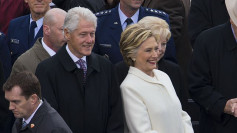The FBI and U.S. Postal Inspection Service are investigating a series of suspicious packages sent to election officials across more than 15 states, creating heightened concerns amid an already tense voting season. The packages, some containing unknown substances, were delivered to offices in states like Nebraska, Kansas, Wyoming, and Iowa, leading to evacuations and triggering investigations by federal authorities. The packages have disrupted operations in several election offices as early voting gets underway for the upcoming national elections.
In some cases, the packages were found to contain white powder, which prompted immediate responses from hazmat teams. For example, in Nebraska, the election office received a package with a return label from the self-styled "US Traitor Elimination Army." A similar package in Oklahoma also contained a white substance, which was later identified as flour. Despite initial fears, no harmful materials have been detected so far, but the incidents have raised significant alarm among election officials.
The Colorado Secretary of State's office reported that their package was intercepted at a mail facility before reaching its destination, and early testing indicated the powder it contained was harmless. The FBI continues to collect these packages and is working with federal partners to trace their origins and determine who is responsible. According to FBI spokesperson Kristen Setera, "We are working to determine how many letters were sent, the individual or individuals responsible, and the motive behind the letters."
This isn't the first time suspicious mail has been sent to election offices. Just last year, packages containing fentanyl were delivered to election offices in six states, leading to delayed vote counting and evacuations. These incidents have added to a growing trend of threats and harassment targeting election workers since the 2020 presidential election. Election offices across the country have since ramped up security measures to protect staff and ensure the integrity of the voting process.
Officials are treating this new wave of packages with caution, although there have been no injuries or confirmed cases of hazardous materials. Rosie Nichols, spokesperson for the Topeka Fire Department, said after a field test in Kansas, "There were no hazardous materials found." Similar testing in other states, including Wyoming and Iowa, has also indicated that the substances posed no immediate danger. Still, election offices are on high alert, with county officials in Mississippi and other states being warned to be vigilant for suspicious mail.
The timing of these incidents is significant, as they come during early voting for key national elections, heightening concerns over the safety and security of polling places. The National Association of Secretaries of State condemned the attacks in a public statement, calling it a "disturbing trend" of threats against election workers. "This must stop, period," the statement added, emphasizing that such acts of intimidation have no place in a democracy.
Election officials and law enforcement agencies are treating the packages as part of an ongoing campaign of intimidation targeting the democratic process. Some experts believe the incidents could be linked to broader attempts to undermine public confidence in elections. The FBI's investigation will focus not only on identifying those responsible but also on understanding the motive behind these threats. Federal authorities, including the Department of Homeland Security, are closely monitoring the situation, and election workers have been advised to be cautious but continue their work to ensure that voting operations proceed smoothly.
As election offices in states such as Massachusetts and New York report similar findings, it remains clear that this issue is widespread. While officials work to address these threats, the public is being assured that their safety is a top priority, and security measures are being put in place to protect both election workers and the voting process. Secretary of State Paul Pate of Iowa emphasized the importance of resilience in the face of these threats, saying, "We have specific protocols in place for situations such as this," after the evacuation of the Lucas State Office Building in Des Moines.






